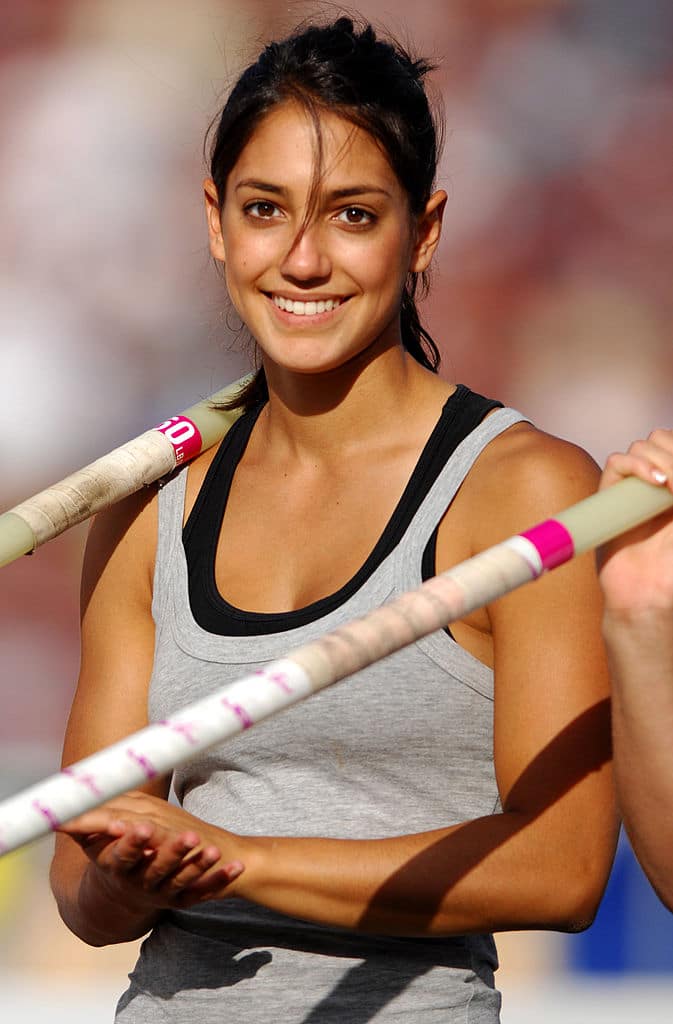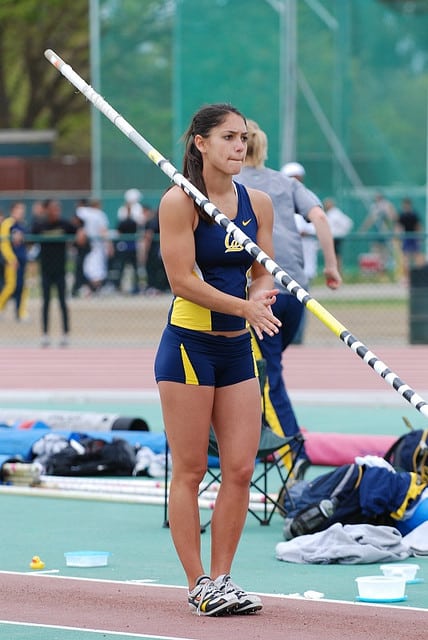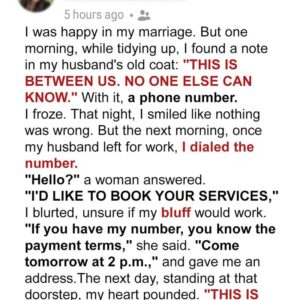She was just 17 when a single photograph changed everything. Allison Stokke was meant to be known for her strength, her focus, and her record-breaking pole vaults. But instead, she was thrust into the spotlight for all the wrong reasons—turning into a viral internet sensation without her consent, her identity hijacked by objectification that eclipsed her athletic talent.
Before the whirlwind, Allison was like many other dedicated athletes—relentlessly driven, quiet in her ambition, and focused on getting better with every jump. Born in Newport Beach, California, on March 22, 1989, she came from a family that celebrated athletic excellence. Her older brother, David, was a national-level gymnast, and Allison initially followed his path before discovering her own love for pole vaulting in high school.
She wasn’t just good—she was exceptional. By 15, she had already clinched a U.S. title for her age group with a vault of 3.81 meters. Soon after, she broke national records for both freshmen and sophomore classes, reaching heights that made her one of the top young pole vaulters in the country. And all this came despite suffering a broken tibia during training in 2005.
Her rising career, though, was about to collide with a culture that often reduces female athletes to appearances rather than achievements.
In early 2007, while competing in New York, a track-and-field blogger took a routine photo of Allison. She was on the runway, hair pulled back, focused, unaware that this ordinary moment was about to become extraordinarily invasive. The photo was later reposted by a popular sports blog with a disturbingly provocative headline—and that’s when the storm began.
Within days, the image went viral. Blogs, fan pages, forums—suddenly, Allison’s face and body were everywhere. She hadn’t posed for any of it. The photograph wasn’t even sexual in nature, yet it was twisted into something that invited obsession. Tribute sites popped up. Her Myspace inbox filled with over a thousand messages overnight. Strangers began following her. She was no longer just a talented athlete—she was being turned into a fantasy, one she had never agreed to be part of.
The weight of it all forced Allison to call a family meeting. Her mother described the feeling as a mixture of anger and helplessness. Her father, a lawyer, began combing through the web for anything illegal. Allison herself tried to keep it together, even hiring a media consultant to help manage the fallout. But the reality was grim—she had been objectified before she could even understand what was happening.
“I worked so hard for pole vaulting and all this other stuff, and it’s almost like that doesn’t matter,” she once told The Washington Post. “Nobody really sees me.”
Life offline didn’t offer much comfort either. She couldn’t go to a café without noticing stares. She stopped going out alone. She locked the doors when home. The attention brought not just humiliation but fear—stalkers, invasive photographers, and people who no longer saw Allison the athlete, only Allison the symbol.
Even with the distraction, she pushed on. She earned a scholarship to UC Berkeley and majored in sociology, competing throughout college. But while she remained passionate about her sport, her Olympic dreams didn’t materialize—she narrowly missed qualifying for London 2012.
Fortunately, another path awaited. Her athletic background and striking presence made her a sought-after sportswear model. She collaborated with Nike, appeared in GoPro campaigns, and redefined her public image on her own terms. One viral video of her vaulting in first-person with a mounted camera gathered over six million views—this time, with her permission.
In 2017, her life took another turn—one toward peace and love. She began dating professional golfer Rickie Fowler, and the couple married in 2019. They’ve since welcomed two daughters, most recently baby Nellie. These days, their time is filled with workouts, shared goals, and raising a family with quiet joy.
Now 35, Allison has nearly 700,000 Instagram followers—but she’s far more than a number on a screen. She uses her platform to champion girls in sports, shedding light on the emotional and psychological challenges they face. She speaks openly about setbacks, pressure, and resilience, reminding young athletes that power isn’t in perfection but in persistence.
“By the age of 14, girls drop out of sports at two times the rate of boys,” she wrote in a recent post. “Let’s inspire the next generation of girls to redefine what it means to be powerful.”
She isn’t hiding from the past anymore. Instead, she’s shaping the narrative—fierce, unfiltered, and unafraid to talk about the highs and lows of her journey. A Google search may still return that old photo first, but behind it lies a story of perseverance, dignity, and reclaiming identity.
Allison Stokke deserves to be remembered not as an unwilling viral icon, but as a gifted athlete, a powerful advocate, and a woman who refused to be silenced.







